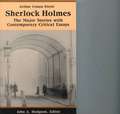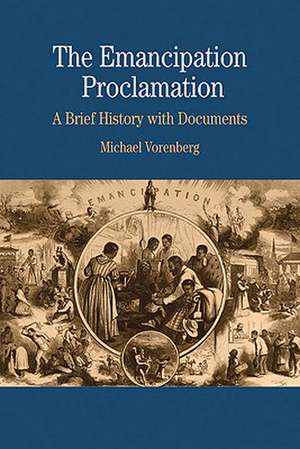The Emancipation Proclamation: A Brief History with Documents: Bedford Series in History & Culture (Paperback)
Autor Michael Vorenbergen Limba Engleză Paperback – 31 dec 2009
Din seria Bedford Series in History & Culture (Paperback)
-
 Preț: 219.00 lei
Preț: 219.00 lei - 31%
 Preț: 246.18 lei
Preț: 246.18 lei - 32%
 Preț: 219.20 lei
Preț: 219.20 lei -
 Preț: 216.80 lei
Preț: 216.80 lei - 32%
 Preț: 235.03 lei
Preț: 235.03 lei - 32%
 Preț: 223.79 lei
Preț: 223.79 lei - 33%
 Preț: 228.05 lei
Preț: 228.05 lei - 33%
 Preț: 216.80 lei
Preț: 216.80 lei - 33%
 Preț: 216.80 lei
Preț: 216.80 lei - 33%
 Preț: 222.88 lei
Preț: 222.88 lei - 33%
 Preț: 216.25 lei
Preț: 216.25 lei - 32%
 Preț: 235.03 lei
Preț: 235.03 lei - 32%
 Preț: 223.79 lei
Preț: 223.79 lei -
 Preț: 222.68 lei
Preț: 222.68 lei -
 Preț: 211.35 lei
Preț: 211.35 lei -
 Preț: 137.47 lei
Preț: 137.47 lei -
 Preț: 207.89 lei
Preț: 207.89 lei -
 Preț: 207.89 lei
Preț: 207.89 lei -
 Preț: 209.62 lei
Preț: 209.62 lei -
 Preț: 207.71 lei
Preț: 207.71 lei - 32%
 Preț: 235.03 lei
Preț: 235.03 lei - 33%
 Preț: 217.46 lei
Preț: 217.46 lei - 31%
 Preț: 160.87 lei
Preț: 160.87 lei -
 Preț: 198.58 lei
Preț: 198.58 lei
Preț: 223.36 lei
Preț vechi: 331.11 lei
-33% Nou
Puncte Express: 335
Preț estimativ în valută:
42.74€ • 44.62$ • 35.37£
42.74€ • 44.62$ • 35.37£
Carte indisponibilă temporar
Doresc să fiu notificat când acest titlu va fi disponibil:
Se trimite...
Preluare comenzi: 021 569.72.76
Specificații
ISBN-13: 9780312435813
ISBN-10: 0312435819
Pagini: 172
Dimensiuni: 137 x 203 x 10 mm
Greutate: 0.23 kg
Editura: BEDFORD BOOKS
Seria Bedford Series in History & Culture (Paperback)
Locul publicării:New York, United States
ISBN-10: 0312435819
Pagini: 172
Dimensiuni: 137 x 203 x 10 mm
Greutate: 0.23 kg
Editura: BEDFORD BOOKS
Seria Bedford Series in History & Culture (Paperback)
Locul publicării:New York, United States
Cuprins
PART I: THE MAKING AND MEANING OF EMANCIPATION
PART II: THE DOCUMENTS
Abraham Lincoln, Cooper Union Address, February 27, 1860
Abraham Lincoln, Letter to Lyman Trumbull, December 10, 1861
Abraham Lincoln, Letter to Alexander H. Stephens,
Alexander H. Stephens, Cornerstone Speech, March 21, 1861
Abraham Lincoln, First Inaugural, March 4, 1861
John J. Cheatham, Letter to L. P. Walker, May 4, 1861
Benjamin Butler, Letter to Winfield Scott, May 24, 1861
Abraham Lincoln, Letter to Orville Browning, September 22, 1861
The Pacific Appeal, Editorial on Emancipation, June 14, 1862
George B. McClellan, Harrison's Landing Letter, July 7, 1862
Samuel J. Kirkwood, Letter to Henry W. Halleck, August 5, 1862
Lydia Maria Child, Letter to John G. Whittier, January 21, 1862
Frederick Douglass, 'The Slaveholders Rebellion,' July 4, 1862
Abraham Lincoln, Letter to Horace Greeley, August 22, 1862
Abraham Lincoln, Preliminary Emancipation Proclamation,
Benjamin R. Curtis, Executive Power, 1862
Grosvenor Lowrey, Commander-In-Chief, 1862
Edward D. Marchant, Abraham Lincoln, 1863
Adalbert Johann Volck, Writing the Emancipation
Abraham Lincoln, Annual Message to Congress, December 1, 1862
Abraham Lincoln, Final Emancipation Proclamation, January 1, 1863
The Pacific Appeal, 'The Year of Jubilee Has Come!' January 3, 1863
'The Emancipation Proclamation,' the Cincinnati Daily Enquirer,
January 3, 1863
James H. Hudson, Letter to the Pacific Appeal, February 25, 1863
Harper's Weekly, Sensation among 'Our Coloured Brethren,'
December 20, 1863
Thomas Nast, The Emancipation of the Negroes, January 24, 1863
H. Ford Douglas, Letter to Frederick Douglass, January 8, 1863
Frederick Douglass, 'Men of Colour, to Arms!,' March 1863
Sattie A. Douglas, Letter to the Anglo-African, June 20, 1863
Hannah Johnson, Letter to Abraham Lincoln, July 31, 1863
Martha Glover, Letter to Richard Glover, December 30, 1863
Charlotte Forten, 'Life on the Sea Islands,' June 1864
George E. Stephens, 'The Pay of Coloured Troops,' August 1, 1864
Spotswood Rice, Letter to Kitty Diggs, September 3, 1864
Patrick R. Cleburne, Letter to the Commanders of the Army of the
Tennessee, January 2, 1864
Congress of the Confederate States of America, 'Address to the
People of the Confederate States,' January 22, 1864
Robert E. Lee, Letter to Andrew Hunter, January 11, 1864
Charleston Mercury, 'Lunacy,' January 13, 1865
Richmond Examiner, 'Negro Troops,' February 25, 1865
Harriet Jacobs, Letter to Lydia Maria Child, March 18, 1863
C. B. Wilder, Testimony before the American Freedmen's Inquiry
Commission, May 9, 1863
Noyes Wheeler, 'The Riotous Outbreak in New York,' July 20, 1863
Abraham Lincoln, Gettysburg Address, November 19, 1863
Annie Davis, Letter to Abraham Lincoln, August 25, 1864
Abraham Lincoln, Second Inaugural, March 4, 1864
Abraham Lincoln, Last Public Address, April 11, 1865
Edward D. Townsend, Report on Meeting of African Americans with
Frederick Douglass, Speech in Memory of Abraham Lincoln,
April 14, 1876
Thomas Ball, Freedmen's Memorial to Abraham Lincoln, 1876
Henry W. Herrick, Reading the Emancipation Proclamation in
the Slaves' Cabin, 1864
Historians Assess Emancipation
James M. McPherson, 'Who Freed the Slaves?,' 1996
Ira Berlin, 'Who Freed the Slaves?: Emancipation and Its Meaning'
PART II: THE DOCUMENTS
Abraham Lincoln, Cooper Union Address, February 27, 1860
Abraham Lincoln, Letter to Lyman Trumbull, December 10, 1861
Abraham Lincoln, Letter to Alexander H. Stephens,
Alexander H. Stephens, Cornerstone Speech, March 21, 1861
Abraham Lincoln, First Inaugural, March 4, 1861
John J. Cheatham, Letter to L. P. Walker, May 4, 1861
Benjamin Butler, Letter to Winfield Scott, May 24, 1861
Abraham Lincoln, Letter to Orville Browning, September 22, 1861
The Pacific Appeal, Editorial on Emancipation, June 14, 1862
George B. McClellan, Harrison's Landing Letter, July 7, 1862
Samuel J. Kirkwood, Letter to Henry W. Halleck, August 5, 1862
Lydia Maria Child, Letter to John G. Whittier, January 21, 1862
Frederick Douglass, 'The Slaveholders Rebellion,' July 4, 1862
Abraham Lincoln, Letter to Horace Greeley, August 22, 1862
Abraham Lincoln, Preliminary Emancipation Proclamation,
Benjamin R. Curtis, Executive Power, 1862
Grosvenor Lowrey, Commander-In-Chief, 1862
Edward D. Marchant, Abraham Lincoln, 1863
Adalbert Johann Volck, Writing the Emancipation
Abraham Lincoln, Annual Message to Congress, December 1, 1862
Abraham Lincoln, Final Emancipation Proclamation, January 1, 1863
The Pacific Appeal, 'The Year of Jubilee Has Come!' January 3, 1863
'The Emancipation Proclamation,' the Cincinnati Daily Enquirer,
January 3, 1863
James H. Hudson, Letter to the Pacific Appeal, February 25, 1863
Harper's Weekly, Sensation among 'Our Coloured Brethren,'
December 20, 1863
Thomas Nast, The Emancipation of the Negroes, January 24, 1863
H. Ford Douglas, Letter to Frederick Douglass, January 8, 1863
Frederick Douglass, 'Men of Colour, to Arms!,' March 1863
Sattie A. Douglas, Letter to the Anglo-African, June 20, 1863
Hannah Johnson, Letter to Abraham Lincoln, July 31, 1863
Martha Glover, Letter to Richard Glover, December 30, 1863
Charlotte Forten, 'Life on the Sea Islands,' June 1864
George E. Stephens, 'The Pay of Coloured Troops,' August 1, 1864
Spotswood Rice, Letter to Kitty Diggs, September 3, 1864
Patrick R. Cleburne, Letter to the Commanders of the Army of the
Tennessee, January 2, 1864
Congress of the Confederate States of America, 'Address to the
People of the Confederate States,' January 22, 1864
Robert E. Lee, Letter to Andrew Hunter, January 11, 1864
Charleston Mercury, 'Lunacy,' January 13, 1865
Richmond Examiner, 'Negro Troops,' February 25, 1865
Harriet Jacobs, Letter to Lydia Maria Child, March 18, 1863
C. B. Wilder, Testimony before the American Freedmen's Inquiry
Commission, May 9, 1863
Noyes Wheeler, 'The Riotous Outbreak in New York,' July 20, 1863
Abraham Lincoln, Gettysburg Address, November 19, 1863
Annie Davis, Letter to Abraham Lincoln, August 25, 1864
Abraham Lincoln, Second Inaugural, March 4, 1864
Abraham Lincoln, Last Public Address, April 11, 1865
Edward D. Townsend, Report on Meeting of African Americans with
Frederick Douglass, Speech in Memory of Abraham Lincoln,
April 14, 1876
Thomas Ball, Freedmen's Memorial to Abraham Lincoln, 1876
Henry W. Herrick, Reading the Emancipation Proclamation in
the Slaves' Cabin, 1864
Historians Assess Emancipation
James M. McPherson, 'Who Freed the Slaves?,' 1996
Ira Berlin, 'Who Freed the Slaves?: Emancipation and Its Meaning'
Recenzii
'In this single volume, Vorenberg presents the essential primary sources and supporting explanation necessary to tell the fascinating story of the development and impact of the Proclamation. Perhaps the greatest strength of the book, however, is that it cannot help but foster the high level of classroom discussion this topic deserves.' - Charles W. Sanders, Jr., Kansas State University, USA
'Vorenberg has done a masterful job editing and contextualizing this collection of documents. The primary sources fascinate, the introduction and headnotes are informative and engaging, and Vorenberg guides students toward comprehension of the complexities of the emancipation question. This is a valuable collection.' - Robert E. May, Purdue University, USA
'The best brief introduction to the Emancipation Proclamation.' - James Oakes, CUNY Graduate Center, USA
'Vorenberg has done a masterful job editing and contextualizing this collection of documents. The primary sources fascinate, the introduction and headnotes are informative and engaging, and Vorenberg guides students toward comprehension of the complexities of the emancipation question. This is a valuable collection.' - Robert E. May, Purdue University, USA
'The best brief introduction to the Emancipation Proclamation.' - James Oakes, CUNY Graduate Center, USA
Notă biografică
MICHAEL VORENBERG (Ph.D., Harvard University) is associate professor of history at Brown University, UK, where he teaches courses on antebellum America, the Civil War and reconstruction, race and law, and American legal and constitution history. Vorenberg's research interests lie at the intersection of three fields in American history: the Civil War era, legal and constitution history, and race and emancipation. He is author of Final Freedom: The Civil War, the Abolition of Slavery, and the Thirteenth Amendment (2001), a finalist for the Lincoln Prize in 2002, as well as numerous essays and articles on topics ranging from Lincoln's plans for the colonization of African Americans to the meaning of rights and privileges under the Fourteenth Amendment.
Caracteristici
The introduction summarizes the history and national debate over slavery from the country's founding through the Civil War and beyond
More than 40 documents and images give voice to the range of actors who participated in this vital drama — Lincoln and Douglass, slaves and slaveholders, black and white men and women working for abolition, and northern and southern editorialists
Essays by contemporary historians Ira Berlin and James McPherson argue the question of who freed the slaves
Descriere
In his 1861 inaugural address Lincoln vowed not to interfere with slavery. Yet two years later he signed the Emancipation Proclamation, setting the stage for national emancipation. This volume reveals the complexity of the process by which African-Americans gained freedom and explores the struggle over its meaning.
